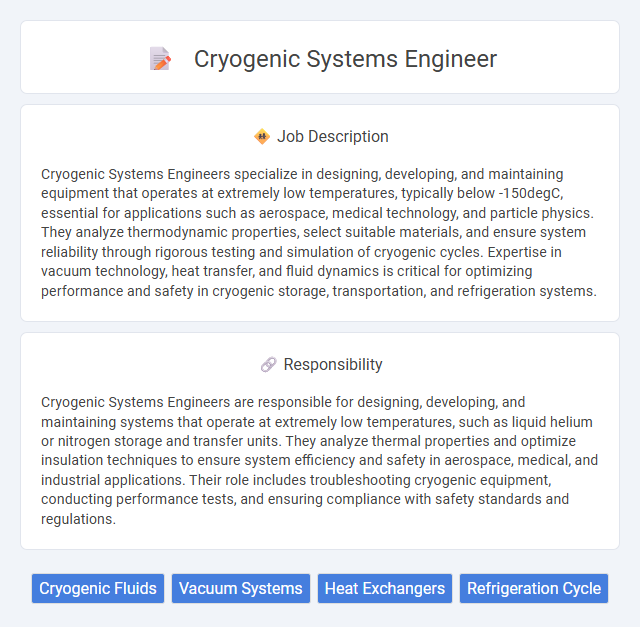
Cryogenic Systems Engineers specialize in designing, developing, and maintaining equipment that operates at extremely low temperatures, typically below -150degC, essential for applications such as aerospace, medical technology, and particle physics. They analyze thermodynamic properties, select suitable materials, and ensure system reliability through rigorous testing and simulation of cryogenic cycles. Expertise in vacuum technology, heat transfer, and fluid dynamics is critical for optimizing performance and safety in cryogenic storage, transportation, and refrigeration systems.
People with strong analytical skills and a passion for advanced technology are likely to excel as Cryogenic Systems Engineers. Those comfortable working in highly technical environments and solving complex problems will probably find the job fulfilling. Individuals who can handle precise, detail-oriented tasks and adapt to evolving cryogenic technologies are likely to be well-suited for this role.
Qualification
A Cryogenic Systems Engineer typically requires a bachelor's degree in mechanical, aerospace, or electrical engineering, with advanced knowledge in thermodynamics and fluid mechanics. Proficiency in CAD software, experience with cryogenic fluid behavior, and hands-on work in low-temperature systems are critical qualifications. Strong problem-solving skills and familiarity with safety regulations in cryogenic technology enhance job performance.
Responsibility
Cryogenic Systems Engineers are responsible for designing, developing, and maintaining systems that operate at extremely low temperatures, such as liquid helium or nitrogen storage and transfer units. They analyze thermal properties and optimize insulation techniques to ensure system efficiency and safety in aerospace, medical, and industrial applications. Their role includes troubleshooting cryogenic equipment, conducting performance tests, and ensuring compliance with safety standards and regulations.
Benefit
Cryogenic Systems Engineers likely enjoy benefits such as working with cutting-edge technology that advances scientific research and industrial applications. They probably receive competitive salaries and comprehensive health benefits due to the specialized nature of their expertise. Opportunities for professional growth and involvement in innovative projects may also be common advantages in this role.
Challenge
Cryogenic Systems Engineer roles likely involve tackling the complex challenge of designing and maintaining equipment that operates at extremely low temperatures, where material behavior can be unpredictable. The probability of encountering issues such as thermal stress, insulation failure, and precise temperature control is high, demanding innovative problem-solving skills. Managing these risks while ensuring system reliability and performance could remain a persistent and critical challenge in this field.
Career Advancement
Cryogenic Systems Engineers develop and maintain advanced cooling systems essential for aerospace, medical, and industrial applications, leveraging expertise in thermodynamics and fluid mechanics. Career advancement often involves progressing to senior engineering roles, project management, or specialized research positions within sectors like aerospace or energy. Mastery of cryogenics software tools and gaining certifications in systems engineering can accelerate promotion opportunities and leadership responsibilities.
Key Terms
Cryogenic Fluids
Cryogenic Systems Engineers specialize in the design, analysis, and maintenance of systems that handle cryogenic fluids such as liquid nitrogen, oxygen, and helium, ensuring safe and efficient storage and transfer at extremely low temperatures. They utilize expertise in thermodynamics, fluid mechanics, and materials science to optimize insulation, minimize thermal losses, and prevent fluid phase changes. Proficiency in CAD modeling, cryogenic process control, and compliance with safety standards is essential for advancing technology in aerospace, medical, and energy sectors.
Vacuum Systems
A Cryogenic Systems Engineer specializing in vacuum systems designs, tests, and maintains ultra-high vacuum environments essential for cryogenic applications, ensuring minimal thermal contamination and optimal heat insulation. Expertise in vacuum pump technologies, leak detection, and vacuum chamber fabrication is critical to achieving stable low-temperature operations in fields like aerospace, medical imaging, and particle accelerators. Proficiency in integrating vacuum systems with cryostats and managing outgassing and cryopumping effects enhances system efficiency and reliability.
Heat Exchangers
Cryogenic Systems Engineers specialize in designing and optimizing heat exchangers that operate at extremely low temperatures to efficiently transfer thermal energy in cryogenic environments. They analyze material properties and fluid dynamics to enhance the performance and reliability of heat exchangers used in liquefied gas storage, superconducting magnets, and space applications. Expertise in thermal conductivity, phase change, and insulation techniques is critical for minimizing heat transfer losses and ensuring system stability in cryogenic processes.
Refrigeration Cycle
Cryogenic Systems Engineers specialize in designing and optimizing refrigeration cycles to achieve ultra-low temperatures essential for applications such as superconducting magnets, space exploration, and LNG processing. Their expertise includes selecting appropriate refrigerants, analyzing thermodynamic properties, and enhancing system efficiency through advanced heat exchangers and expansion turbines. Mastery of the vapor-compression and Joule-Thomson refrigeration cycles ensures reliable performance in critical cryogenic equipment and minimizes energy consumption.
 kuljobs.com
kuljobs.com